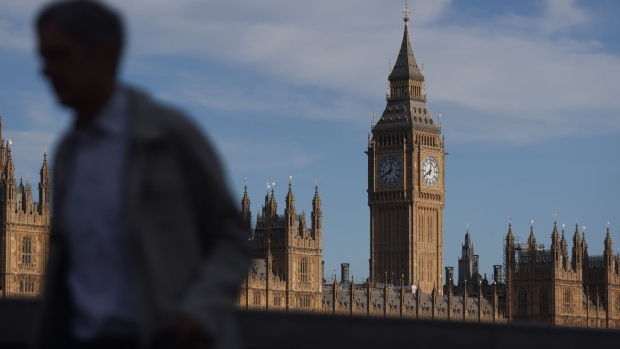Nov 28, 2022
UK Rewrites Online Safety Bill to Address Free Speech Backlash
, Bloomberg News

(Bloomberg) -- The UK government scrapped plans to define and regulate “legal but harmful speech” from the Online Safety Bill as it prepares to bring the long-awaited and controversial legislation back to Parliament next week.
Ministers axed a planned “harmful communications” offense that would have applied to social media posts sent with the intention of causing harm, resulting in “serious distress,” the Department for Digital, Culture, Media and Sport said late on Monday in a statement.
By making the changes, the government said it hopes to allay the concerns of free speech campaigners that the bill risked causing unintended consequences such as criminalizing “legal and legitimate speech.” At the same time, ministers are seeking to ease passage of the contentious bill through Parliament so that it can achieve its primary goal of protecting young people online.
“Today’s announcement refocuses the Online Safety Bill on its original aims: the pressing need to protect children and tackle criminal activity online while preserving free speech,” the DCMS said.
The proposals have been in development for more than five years under seven Conservative Party culture secretaries, though the legislation itself was only introduced to Parliament in March.
‘Triple Shield’
Under the revised plans, instead of creating categories of legal content for companies and regulators to oversee, the bill now establishes a “triple shield” of protections:
- Companies must remove content already ruled illegal, such as hate crime, fraud, and death threats
- They must remove posts breaching their own terms of service
- Adults must be given more control and filters over the content they are served
The bill creates duties for companies that host user-generated content and also for search engines to demonstrate how they will protect users. Failure to follow the rules will leave them facing fines and sanctions from media watchdog Ofcom. Although it’s a particular focus for so-called Big Tech businesses such as Meta Platforms Inc. and Twitter Inc., when passed, the law will affect more than 20,000 enterprises, according to a previous government impact assessment.
Tech companies will be banned from removing or restricting user-generated content, or suspending or banning users, if they haven’t breached terms of service or the law. Twitter, now owned by Elon Musk, has reversed bans on prominent users including former US President Donald Trump. The UK’s regulatory engagement with Twitter was disrupted by Musk’s dramatic takeover.
Meanwhile, other criminal offenses will be created, including the posting and proliferation of online material that encourages self-harm, an issue which was brought into sharp focus after a judge ruled in September that the death of British teenager Molly Russell was related to her social media use.
The opposition Labour Party disagreed with the changes.
“Removing ‘legal but harmful’ gives a free pass to abusers and takes the public for a ride,” said culture spokeswoman Lucy Powell. “After the Molly Russell inquest, Russian disinformation campaigns, racist abuse against England footballers, incel gangs, eating disorder content, it’s pretty remarkable that the government has watered down this long-awaited bill quite so much.”
(Updates with Labour quote in eleventh paragraph)
©2022 Bloomberg L.P.





